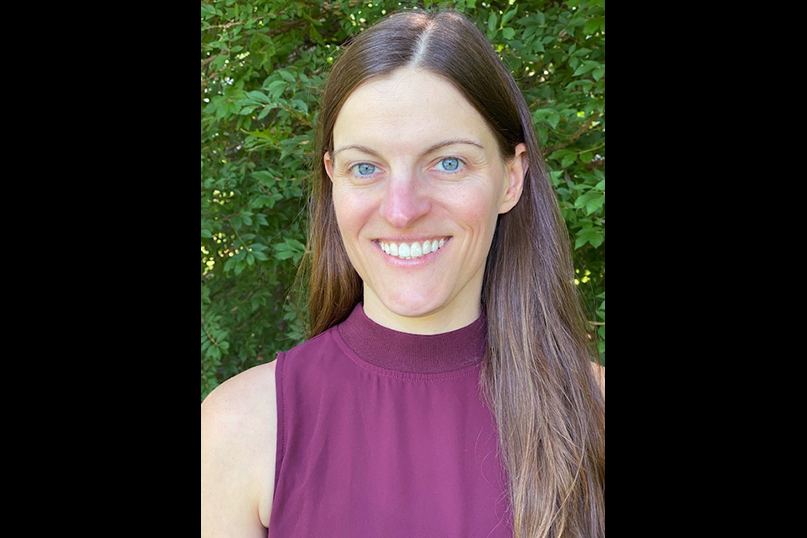
The new director of the University of Hartford’s Greenberg Center aims to create programming on all facets of Jewish life and history
By Stacey Dresner
WEST HARTFORD – Amy Weiss, PhD has been named the new director of the Maurice Greenberg Center for Judaic Studies at the University of Hartford.
Weiss, who will join the Greenberg Center in January, succeeds Avinoam Patt, who left the center to become the Doris and Simon Konover Chair of Judaic Studies and director of the Center for Judaic Studies and Contemporary Jewish Life at the University of Connecticut.
She comes to the Greenberg Center after four years as director of the Center for Holocaust and Genocide Education at Saint Elizabeth University in Morris Township, New Jersey.
Though Weiss, who grew up in a Reform home in New Jersey, says she didn’t set out to become a Jewish educator, her interest in becoming an active member of the Jewish community began when she was growing up.
Her time spent attending Kutz Camp, the now-defunct summer camp of the Reform movement, which was well known for its teen leadership programming, played a role in her path toward Jewish studies.
“After going to Kutz Camp – which I have to give a shout out to – I knew I wanted to learn Hebrew. So when I went to Rutgers for my undergrad [degree], one of the first classes I took was Hebrew…I loved it and because of that one Hebrew class, I took more Hebrew classes and then I thought, let me check out more of the classes in the Jewish studies department, and ended up double majoring in Jewish Studies and sociology.”
Weiss went on to receive an MPhil from New York University and a masters degree from the Jewish Theological Seminary. She received her PhD from NYU’s departments of Hebrew & Judaic Studies and History. Her research and published work focuses on the intersections of American Jewish history, Israel studies, and Jewish-Christian relations, including her soon to be published book on American Jewish-evangelical interfaith relations and the Israeli-Palestinian conflict.
Before she arrives at the Greenberg Center, Weiss will finish up the Thomas and Elissa Ellant Katz Fellowship at the University of Pennsylvania’s Herbert D. Katz Center for Advanced Judaic Studies, where she is working on a book on American Jewish-evangelical relations.
Weiss, who will also serve as assistant professor of Judaic studies and history, and director of the Museum of Jewish Civilization at the University of Hartford, has also taught Judaic studies and American history at Rutgers University and City College of New York. Her additional fellowships and grants include a Special Initiatives Grant from the American Academy for Jewish Research to create the inaugural New Jersey Working Group on Holocaust Research.
“We are very much looking forward to the next era of the Greenberg Center under Amy’s leadership,” said College of Arts and Sciences Dean Katherine Black. “She brings a wealth of administrative experience, scholarship, and teaching to the Greenberg Center.”
Weiss recently spoke to the Jewish Ledger about her new position at the Greenberg Center and her goals as its director.
JEWISH LEDGER: Tell us about your role at the Holocaust Center at Saint Elizabeth University (formerly the College of Saint Elizabeth).
AMY WEISS: I had been [at the College of Saint Elizabeth] since 2016 as director of the Center for Holocaust and Genocide Education, a program that has been in existence since the 1990s. It’s a Catholic University that takes the study of the Holocaust and genocide very seriously.
Essentially, I work with students and colleagues on campus and with students on campuses close by – Fairleigh Dickinson and Drew University are literally down the road. We have programming for [public and private school] teachers and students about the Holocaust and genocide. I was also involved with teacher education, bringing in workshop leaders.
In New Jersey, and I know in Connecticut, there is a mandate to teach about the Holocaust and genocide. Teachers, especially secondary school teachers, are overworked and underpaid, and we wanted to give them the best resources possible to help teachers follow that mandate, and really give them the resources and tools that they might not otherwise have.
How do you envision your role as director of the Greenberg Center, a professor in Jewish studies, and director of the campus Jewish Museum?
My background is research specializing in American Jewish history and I definitely see coming to the Greenberg Center as a way to use that knowledge and create programming, not just around American Jewish history, but on all facets of Jewish life and history. And so, I see this as a way to expand what I’ve already been doing. My position at the Center for Holocaust and Genocide education has given me a background in past and current genocides and I’ve been working already with the HERO Center, the Holocaust Center at Hartford. So, I see this as really just expanding what I’ve already been doing. I’m really looking forward to continuing the partnerships that the Center has already made and throughout Hartford and throughout Connecticut. I’m looking forward to growing the Jewish studies major – having programming specifically for the undergrad population. Right now, I’m just interested in taking it all in and getting a sense of it.
I’m really looking forward to being part of the University of Hartford community. Everyone has been so welcoming from Avi Patt to Dean Katherine Black, Arnold Greenberg, and Warren Goldstein, the head of the search committee. I’ll also have a joint appointment in Jewish Studies and History and he’s the department chair so I really look forward to working with him. I haven’t even officially started yet but I feel like I already have colleagues there. Everyone’s been so supportive.
Does expanding throughout Connecticut include working with Avi Patt, your predecessor at the Greenberg Center who is now at UConn?
Definitely. I’ve known Avi for some time due to our participation in the Association for Jewish Studies, so it’s been such a treat to get to work with him in this transition. He’s been so supportive and has really helped me to navigate the Greenberg Center before I even get there. We had a meeting the week before Thanksgiving talking about programming that we’re going to do for the spring. The calendar isn’t up yet so I don’t want to spoil any surprises, but we definitely have a great lineup where we will be collaborating on programs together. It makes sense, I think, to work together, especially during the pandemic.
Tell us about the book you are currently writing on American Jews, the American Protestant community and the Evangelicals.
I see this project as having so much resonance in the current political moment. When you look at who was voting in the 2020 election, religious ideologies definitely play a role in who the candidates are looking to for support, all the more so when it comes to Israel.
I’ve also been really interested in Jewish-Christian relations. American Jews have always been a small minority of the population and I think we’ve always looked to other groups to help integrate into society. I think that’s the case with many other ethnic, religious, racial groups. And so I really see interfaith relations, intergroup relations, as a hallmark of American Jewish history itself.
What are your thoughts about the rise of antisemitism on campus?
I think all campuses need to be concerned about antisemitism or any form of hatred or racism. I think it’s important that there is an education component that ensures that people have a real understanding of the issues that need to be addressed. I think with education you can help to root out some of those issues. I’ve talked with the Hillel director about this when I was last on campus. I am looking to do an entire program related to all types of hatred, ensuring the idea that “Never Again” really means never again to all forms of hatred. We’re looking forward to having a program to highlight the diversity of Jewish life and I think that’s also really helpful [for people to know that] Jews don’t look one way. They don’t live in only one country. And I think there’s also where my research comes in. This spring I’ll be teaching a class on American Jewish diversity… looking at the diversity within American Judaism, looking at the different movements, but also looking at how the members of these different movements are aligning with Americans across racial, ethnic, and all other types of boundaries. I’m really excited about this class and I think some of the work that we’re doing with University of Connecticut will really overlap with some of the public programming that’s going on.







 Southern New England Jewish Ledger
Southern New England Jewish Ledger















